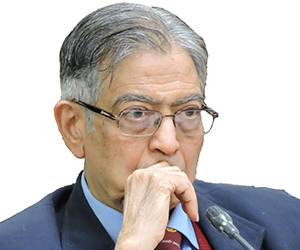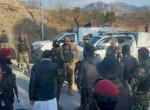Despite repeated rebuffs by Pakistan, New Delhi continues to entertain the belief that the troublesome neighbour will soften up with sweet diplomacy. What else explains the need for India’s Foreign Secretary to mouth the untruth that Pakistan wants to be constructive?
While having little to show by way of a concrete and tangible outcome, the recently held India-Pakistan Foreign Secretary level talks are nonetheless significant in terms of providing indicators of the likely timbre and trend of the relationship between the two countries in the months ahead.
A critical analysis of the media interaction of the Foreign Secretaries and the joint statement issued after their talks would lead to the following conclusions.
Discussions on Jammu & Kashmir were held as required but they did not yield any result other than an agreement to continue the talks. It would appear that even the four-point ‘Musharraf proposal’, which was being explored through the back channel, no longer enjoys much traction.
Pakistan has refused to acknowledge that it was in any way involved in the Mumbai attacks despite the additional corroborative evidence made available to it by way of Abu Jundal’s revelations. It also did not provide any credible assurance that it would bring the perpetrators of those attacks to justice expeditiously. The best that it could come up with was that it was prepared to engage in a joint investigation, which naturally India did not take up. Indeed, on his way back home the Pakistani Foreign Secretary made out to the Indian media that no evidence on Abu Jundal had been shared with him by his Indian counterpart.
However, the Secretaries agreed on certain issues, such as the convening of meetings of the expert-level working group on nuclear and conventional confidence building measures and the convening of another meeting on July 19 at Islamabad to maintain peace along the Line of Control so as to streamline and strengthen travel and trade arrangements. They also decided that the two sides should work for the early signing of the already finalised bilateral visa agreement as well as enhance media and cricketing exchanges. Finally, both leaders agreed that the India’s Minister for External Affairs will visit Pakistan in September 2012.
Despite the slim pickings from the aforesaid talks and the heat generated by the Jundal disclosures, both Secretaries went out of their way to paint an unrealistically rosy picture of the discussions. On his part, the Pakistani Foreign Secretary stated that the exchanges had been “substantive”, were held in a “cordial atmosphere” and over the years the level of cooperation on terrorism between India and Pakistan had “improved”. While it is understandable that Pakistan should wish to give a positive spin to its relations with India, given that it is in the dog house, it was strange to see our own Foreign Secretary doing likewise, albeit on a slightly lower key. Was there any reason for him to state, “There is a determination on both sides to take forward our dialogue with an open mind and a constructive spirit”, when this is manifestly not the case?
The convening of the Foreign Secretary level talks amidst such bon- homie despite the lack of any meaningful forward movement, and the scheduling of the Indian External Minister’s visit to Pakistan in September 2012, in the immediate backdrop of Abu Jundal’s corroborative disclosures regarding the ISI’s involvement in the Mumbai attacks, is a clear indicator that India will continue to engage Pakistan, whether or not the latter brings to book the perpetrators of those attacks. Indeed, it would be fair to extrapolate that even if there were to be another major terrorist incident in India, aided and abetted by Pakistan, it is highly unlikely that the Government would go beyond verbal protestations.
India’s pusillanimous approach vis a vis Pakistan is based on two factors. First, Prime Minister Manmohan Singh lacks the will to take stern measures against Pakistan and to penalise it for its involvement in terrorist actions against India. He appears to be convinced of the logic of what he signed on to in July 2009 at Sharm el-Sheikh with his Pakistani counterpart, that dialogue is the only way forward and that action on terrorism should not be linked with the peace process. Both processes must proceed independently.
Though in the wake of the upsurge of popular criticism following the enunciation of this approach at Sharm el-Sheikh, Mr Singh put on hold the resumption of the composite dialogue and made it contingent on forward movement in addressing India’s concerns on terror, this was only a temporary adjustment. Throughout 2010, steps were taken which gradually led to the resumption of the composite dialogue process the following year even though Pakistan did absolutely nothing to address India’s concerns on terrorism.
As a result, today India is in the strange position of being engaged in broad-based discussions with Pakistan on all bilateral issues at a time when Islamabad not only refuses to bring to book the perpetrators of the Mumbai attacks, but is actively involved in terrorist activities directed against India, which can at any time result in another 26/11.
Second, Mr Singh is keen to visit Pakistan, and for that an aura of normalcy in the relationship is critical. This is being sought to be achieved by creating a false sense of positivity in bilateral interactions and by refraining from taking any punitive steps against Pakistan.
The danger of such a weak approach is that it will only encourage Pakistan to continue its use of terrorism as a policy against India. The only way in which New Delhi can get Pakistan to seriously consider addressing India’s concerns on terrorism is by penalising it. Regrettably, India has never done so and is, therefore, in a sense responsible for Pakistan’s persistent delinquency in this regard.
The dangers posed by the Prime Minister’s desire to visit Pakistan arise from the requirement that such an exercise must be a ‘success’ or put in another way, marked by a number of agreements. But conclusion of the latter would come at the cost of major concessions by India. Pakistan, particularly in its dealings with India, is not known for it’s proclivity to go the extra mile in making settlements.
Accordingly, in the event of Mr Singh’s visit to Pakistan, as speculated, towards the end of this year, one should be prepared not merely for much bonhomie but also for sell-outs on issues like Sir Creek and Siachen, appropriately sweetened by economic goodies.
Published Date: 19th July 2012










Post new comment